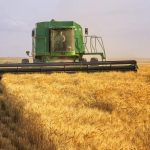Greer: Deal with Switzerland imminent, no details on dairy
Trade Representative Jamieson Greer said today that the United States has reached a trade deal with Switzerland.
In an interview with CNBC, Greer said the deal would ease imports of Swiss pharmaceuticals and some other products.
“They are going to send a lot of their manufacturing to the United States — pharmaceuticals, gold smelting, railway equipment,” Greer said.
Swiss officials said the deal would lower the U.S. tariff on Swiss products from 39% to 15%, The New York Times reported.
Swiss dairy farmers have complained that the high U.S. tariff has interfered with their exports of Gruyère, Emmentaler, Tilsiter and Appenzeller cheese to the United States.
Greer did not discuss Swiss food products in the interview, but the joint statement from the Swiss and U.S. governments and the fact sheet on the agreement posted on the White House site made references to agriculture and food.
The documents released by the Trump administration focused more on U.S. access to the markets of Switzerland and Liechtenstein, which is also covered by the agreement.
“Switzerland and Liechtenstein intend to improve market access for U.S. goods, through the application of zero duties on all U.S. industrial goods, U.S. seafood, and certain U.S. agricultural goods, and through the application of tariff rate quotas for a number of other U.S. agricultural goods,” the joint statement said.
The United States also said it “acknowledges the efforts made by Switzerland to facilitate trade in beef and beef products.”
The joint agreement says, “Participants intend to discuss robust commitments related to intellectual property rights protection and enforcement, including transparent and fair treatment of geographical indications.”
“Switzerland intends to work with the United States to address specific measures that restrict market access for U.S. poultry and poultry products, strengthening opportunities for U.S. agricultural exports in Switzerland. The United States and Switzerland intend to cooperate on streamlining sanitary requirements for labelling and certificates, particularly for beef, bison and dairy products.”
The fact sheet also said “Switzerland and Liechtenstein intend to remove a range of tariffs across agriculture and industrial sectors, including various fresh and dried nuts, fish and seafood, certain fruits, chemicals, and spirits such as whiskey and rum. In addition, Switzerland will establish tariff rate quotas for American poultry, beef and bison.”
Asked in the CNBC interview about whether the Trump administration’s decision to allow exemptions for agricultural products including bananas and coffee in agreements with Latin American countries was an admission that tariffs are raising prices for American consumers, Greer said that whether suppliers pay the tariffs or pass them on to consumers varies by the situation.
Meanwhile, the U.S. Dairy Export Council and the National Milk Producers Federation praised the Trump administration’s announcement of new trade frameworks with Argentina, Ecuador, El Salvador and Guatemala.
“U.S. dairy exports to U.S.-Central America-Dominican Republic Free Trade Agreement partners have almost doubled over the past five years,” said Gregg Doud, president and CEO of NMPF.
“The frameworks the administration has negotiated with Guatemala and El Salvador position our exporters to really capitalize on that landscape during the first duty-free year of dairy trade under the CAFTA-DR trade agreement by ensuring that nontariff trade barriers don’t slow our progress,” Doud said.
“Non-tariff barriers tend to sprout up like weeds when tariffs disappear, which is why these commitments are so important in this region. The nontariff commitments announced with Argentina and Ecuador also may help resolve multiple long-standing issues in those markets,” Doud said.
“Dairy farmers look forward to seeing the details on them as well as on the tariff commitments the deals include.”
Axios reported that coffee prices are rising in Kansas City faster than anywhere else in the country.
Tariffs on food cause higher costs for immigrant communities, The New York Times reported.






